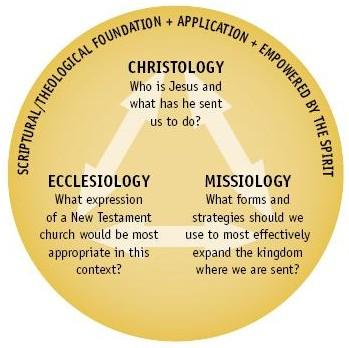Previous reviews here.
The thrust of ReJesus is to recover the centrality of Jesus’ example for the church–radical, passionate, merciful.  Hirsch suggests recalibrating discipleship and church by the template of Jesus: “whether one talks about becoming a little Jesus or uses that wonderful old phrase “imitation of Christ,” the essential function is clear—the modeling ourselves upon his life lies at the center of our spirituality.” A timely call to a methods, not Jesus-driven American Church. Hirsch goes on to provide a four page chart of how we can imitate Jesus (56-60). I cannot help but detect a dangerous tendency towards a new moralism, a WWJD without the power of the gospel to do it. The imitation of Christ minus the power of the Spirit. So I recently asked Alan:
Hirsch suggests recalibrating discipleship and church by the template of Jesus: “whether one talks about becoming a little Jesus or uses that wonderful old phrase “imitation of Christ,” the essential function is clear—the modeling ourselves upon his life lies at the center of our spirituality.” A timely call to a methods, not Jesus-driven American Church. Hirsch goes on to provide a four page chart of how we can imitate Jesus (56-60). I cannot help but detect a dangerous tendency towards a new moralism, a WWJD without the power of the gospel to do it. The imitation of Christ minus the power of the Spirit. So I recently asked Alan:
What keeps imitatio Christ from becoming a new works-righteousness? He replied:
“You are right that imitatio can become works righteousness. But I guess most of us are not in danger of that as we have have a meaty diet of salvation by grace alone. I guess here what we are saying is akin to Bonhoeffer’s idea of cheap grace layed out in his book Discipleship…(read the rest)”
In chapter three, Hirsch & Frost turn their attention to reJesusing the church and organizations. They argue that many churches have become de-Jesus, religious organizations and what we need is a rebooting with Jesus at the center. Later on in chapter five, they present a much more compelling vision of what it means for us be reJesused. There Hirsch calls us to monotheistic christology, as he did in FWs, but with an ethical spin. The lordship of Christ over all things calls for a distinctive discipleship that is expressed in all domains of life. With Jesus as Lord, there is no such thing as private Christian faith. To be Christian is to be a public little Jesus. This is a robust, biblical vision of Jesus and discipleship. How can a church live under the lordship of Christ in all society in such a way that the society is changed? What does this look like in the marketplace, the Arts, Technology, Education, Science, Government, and so on? They provide a very helpful chart on p. 175 that helps churches begin to implement a reJesused approach.
I skimmed chapter four. Others have reviewed the Jesuses of history much better (Todd Johnson, Philip Jenkins, Jaroslav Pelican, Mark Driscol), though Hirsch and Frost bring out some good insights. Chapter five is worth the book. Again, anytime a missiologist is willing to take up monotheistic christology as a starting place for being the church, i am all ears. Hirsch moves beyond MC into what he calls ethical monotheism, the idea that the oneness and sovereignty of God in Christ compels us to live very differently in all domains of life, to live like Jesus. However, his disproportionate emphasis on the ethical, again, is cause for concern. So I recently asked him:
Is ethical monotheism dangerous ground if we don’t fully grasp ontological monotheism? To which he responded:
“As for the issue of ontology, I do believe that we cannot lose a sense of ontological monotheism and Trinity! But again we are well trained to think this way. what we need is correction. We start with what the Bible and Biblical worldview can affirm and build from there–not the other way around.”
Hirsch’s little phrase—“What we need is correction”—says a lot. The whole book, ReJesus, is an attempt to correct Western, doctrinally-driven, non-Hebraic ways of knowing. ReJesus and chapter six chart this corrective for us.



 Hirsch suggests recalibrating discipleship and church by the template of Jesus: “whether one talks about becoming a little Jesus or uses that wonderful old phrase “imitation of Christ,” the essential function is clear—the modeling ourselves upon his life lies at the center of our spirituality.” A timely call to a methods, not Jesus-driven American Church. Hirsch goes on to provide a four page chart of how we can imitate Jesus (56-60). I cannot help but detect a dangerous tendency towards a new moralism, a WWJD without the power of the gospel to do it. The imitation of Christ minus the power of the Spirit. So I recently asked Alan:
Hirsch suggests recalibrating discipleship and church by the template of Jesus: “whether one talks about becoming a little Jesus or uses that wonderful old phrase “imitation of Christ,” the essential function is clear—the modeling ourselves upon his life lies at the center of our spirituality.” A timely call to a methods, not Jesus-driven American Church. Hirsch goes on to provide a four page chart of how we can imitate Jesus (56-60). I cannot help but detect a dangerous tendency towards a new moralism, a WWJD without the power of the gospel to do it. The imitation of Christ minus the power of the Spirit. So I recently asked Alan: